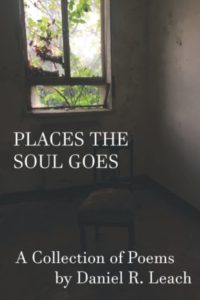Daniel Leach takes us on a journey of souls …
If you’ve ever wondered about the places the soul might go, poet Daniel Leach has some possible, and possibly suggested, answers.
Old houses. A church in Fredericksburg, Texas. Canyons in the American West. Devil’s Hole in the Niagara River. Windows peered through in dreams. A woodland pond. Forests of night. The Pergamon altar in modern-day Turkey (or the Pergamon Museum in Germany). The air full of history in Berlin. Woodstock in 1969. The realm of fairies.
Leach’s latest collection of poems, Places the Soul Goes, is an interior travelogue of thought, belief, exploration, and imagination. Its 32 poems serve as signposts, pointing the way while opening up a world of possibilities. While there are no direct, or even indirect, references to Dante, images of The Divine Comedy keep pushing their way to the surface. The soul is on a journey here, a journey that transcends time and space.
The soul can even attend a party and find its way, like others, to the building’s rooftop.
Rooftops

Through soft-lit backyard trees, the people mill,
And music floats upon the treetop breeze,
Up here, where we look out on the sparkling city.
No one knows one another, but seem they do,
As the beauty of the moment is felt by all—
They linger for a while and sip their wine,
Oh, delicious wine of midsummer night!
A heartfelt smile and they go back downstairs,
Another comes and drinks the air and sky
And waving treetops and bright city lights
And smiles and leaves, until at last it’s time
For fireworks, for it is July the fourth.
They burst, then disappear, our brief joys,
But beautiful as they and all this sink
Into the heart—oh, yes, I think they all
Can feel it too—the sweet sadness there is—
So much is lost, and yet we still hold on.
I go back down and greet the evening’s host,
A great and generous soul whose knowing smile
Tells me he is aware of the great gift
He’s given in that rooftop gathering.
I lift a golden glass and silently
Smile back at him, even as I do now.

Daniel Leach
Our souls often feel singular and alone, and yet, even for a moment, there are times when a shared experience—the view from a rooftop—gives us a glimpse of what binds us together. This sense of discovery and insight permeates the collection’s poems, from the long poems like “The Berlin Air,” “The Devil at Woodstock,” and “Worlds Within Worlds” to the shorter poems about seasons and memory.
Leach publishes classical poems online and in print. He’s spent much of his life advocating for the ideals of classical culture and classical poetry. He’s written essays on the poetry of John Keats, Percy Bysshe Shelley, and other poets, and on the advantages and benefits of reciting poetry. Leach also leads poetry workshops and seminars. He’s previously published the collection Voices on the Wind.
Places the Soul Goes is an invitation from Leach, to join him in a poetic exploration of human experience. Our souls can travel to many places, and we may be surprised at just how many souls are joining us.
Related:
Daniel Leach and Voices on the Wind
Photo by My Public Lands, Creative Commons, via Flickr. Post by Glynn Young.
How to Read a Poem uses images like the mouse, the hive, the switch (from the Billy Collins poem)—to guide readers into new ways of understanding poems. Anthology included.
“I require all our incoming poetry students—in the MFA I direct—to buy and read this book.”
—Jeanetta Calhoun Mish
- Poets and Poems: Alison Blevins and “Where Will We Live if the House Burns Down?” - July 1, 2025
- Poets and Poems: Paul Pastor and “The Locust Years” - June 26, 2025
- What Happened to the Fireside Poets? - June 24, 2025


Dan Leach says
The penultimate line of the cited poem should read, ” I lift a glass…”, not ” I life a glass”.
-the poet
Glynn Young says
It’s been fixed, Dan. Thanks.
Bethany R. says
Thank you for introducing me to this poet’s work. I enjoyed how the last phrase of “Rooftops,” ” . . . even as I do now,” brings me right into the moment the poem is being written. Makes me want to smile too.
I like what Glynn Young points out here, “Our souls often feel singular and alone, and yet, even for a moment, there are times when a shared experience—the view from a rooftop—gives us a glimpse of what binds us together,” and that last hopeful idea, “We may be surprised at just how many souls are joining us.”
Raising a coffee cup to the other reading and writing souls out there in the poetry community—
Glynn Young says
I really like this collection, Bethany. It’s thought-provoking.
Sandra Fox Murphy says
I second Bethany’s comment! I, too, did not know this poet. Such intriguing work you’ve shared here. Yes! Yes to the Palo Duro Canyon, the old Texas churches, a meadow or woodland pond, and on and on. Perhaps in the parking lot. His words illuminate the footsteps we walk in, those of our ancestors. How they still walk beside us. Can’t wait to read more of Mr. Leach’s work. I did go read his poem “the year after your father dies” at Cutleaf. Heart-wrenching revelation! Thank you for sharing, Glynn.
Dan Leach says
Thanks for the kind words, Sandra, but as to “The Year After Your Father Dies “, I’m afraid that you have the wrong Daniel Leach. I was compelled to use my full name, Daniel R Leach, to avoid confusion.
Sandra Fox Murphy says
Sorry about that. It was still a great poem! … but I’ll be reading more of yours.